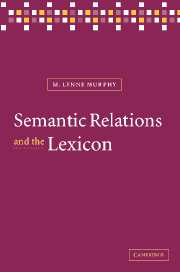Book contents
1 - Why lexical relations?
Published online by Cambridge University Press: 22 September 2009
Summary
“How are you doing?” I would ask.
“Ask me how I am feeling?” he answered.
“Okay, how are you feeling?” […]
“I am very happy and very sad.”
“How can you be both at the same time?” I asked in all seriousness, a girl of nine or ten.
“Because both require each others' company. They live in the same house. Didn't you know?”
Terry Tempest Williams, “The village watchman” (1994)As for any other phenomenon in the world, the existence of paradigmatic semantic relations among words calls for some kind of explanation – or perhaps several kinds of explanation. Are these relations among words, or among the things the words represent? Are the relations arbitrary or rule based? Language specific or universal? A product of linguistic or general cognition? These questions are the focus of this book. First, however, we must ask what these questions mean, and why we might care to trouble ourselves with them.
As linguistic theories have progressed in modeling human language ability, the lexicon has become more central to those theories. With this new or renewed attention to the mental lexicon, two problems become evident. Firstly, there is no generally accepted theory of how the lexicon is internally structured and how lexical information is represented in it.
- Type
- Chapter
- Information
- Semantic Relations and the LexiconAntonymy, Synonymy and other Paradigms, pp. 3 - 24Publisher: Cambridge University PressPrint publication year: 2003



